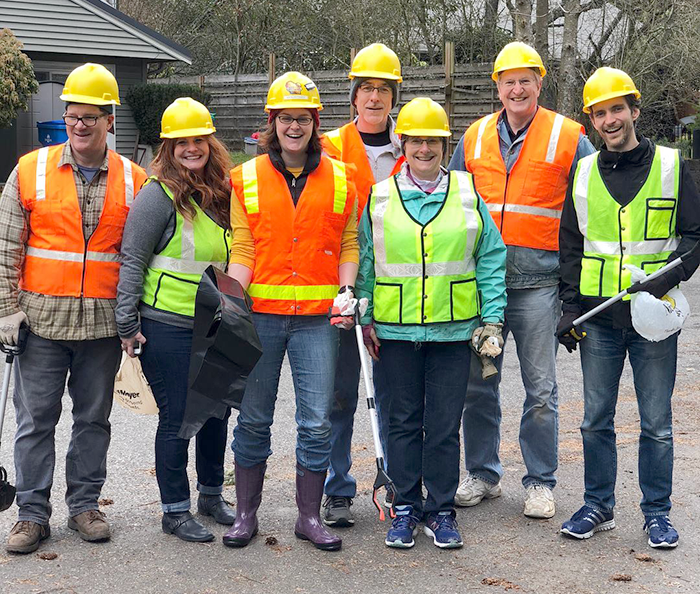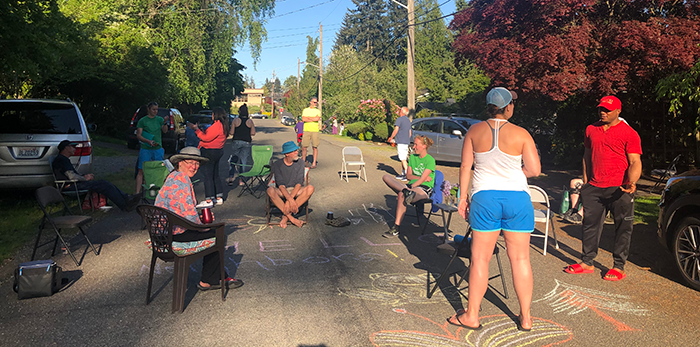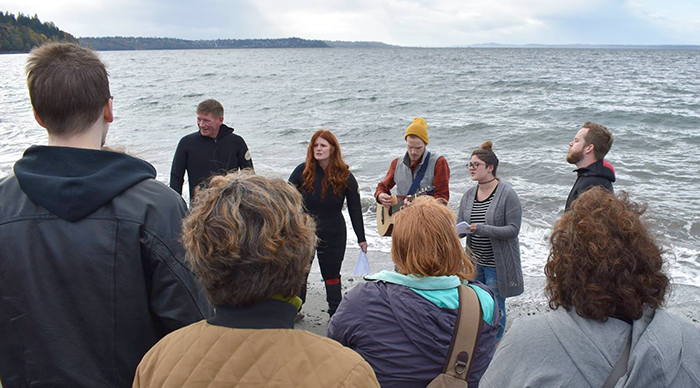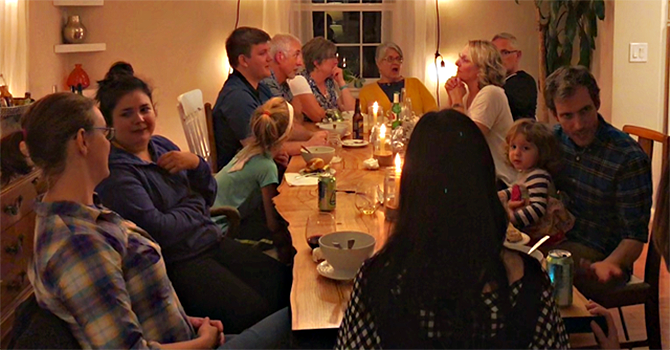The Rev. Jessica Ketola is an old hand at doing church. Her parents were pastors. She served as a worship leader for more than a decade. She recorded Christian praise songs. She ran a church nonprofit that tutored low-income neighborhood children.
But in her mid-40s, the Vineyard-ordained pastor decided to change all the rules.
In January 2017, after a season of upheaval at Vineyard Community Church, where she had been serving as an associate pastor, she relaunched the congregation in her Shoreline, Washington, living room.
Ketola called it The Practicing Church and explained her vision to the 25 or so members that remained: it would be a neighborhood-based church that would serve the community out of a commitment to Jesus’ way of love and a desire for God’s shalom, or peace.

“I had come to a place where I was weary of all the incongruence of the church,” said Ketola, 49, a married mother of four adult children. “I was longing for more authentic ways to express my faith.”
Four years later, worship services still take place in her living room -- except temporarily during the pandemic, when it’s meeting Sunday mornings on Zoom. Although now double in size -- about 50 people -- it is still small but has made a big impact on the neighborhood of Richmond Highlands in Shoreline, a city of 53,000 on the Puget Sound north of Seattle.
Who lives and works in your neighborhood? What are the opportunities and challenges of that place? Who are potential partners for your work?
Instead of a singular focus on the Sunday service or a targeted missions project, The Practicing Church seeks to live Christian life in community.
Ketola did not come up with the vision for a church of the neighborhood. Her church is one of about 1,000 congregations loosely collaborating in the Parish Collective, a nonprofit that connects churches committed to living a life of faith in a particular location.
Borrowing from the Roman Catholic tradition of the parish, in which the faithful were assigned to the church closest to their homes (the Catholic Church no longer requires this), the collective seeks to revive the concept of the church as a geographic unit.
Members of The Practicing Church have picked up trash along neighborhood streets. They have volunteered on local task forces devoted to hunger and homelessness. They’ve offered cups of coffee to people outside a methadone clinic. They’ve started book clubs and a neighborhood garden.

Equally important, they’ve gotten to know their neighbors. Until the pandemic hit, members held regular Wednesday night potlucks in Ketola’s home for anyone who showed up.
They threw a 70th birthday party for a man who was recently widowed. They organized a monthlong meal train for a new mother. They raised money to help an immigrant family settle into an apartment. They supported a Black-owned coffee shop. They secured housing for a homeless couple. When a neighbor’s sister died, Ketola invited the neighbor’s mother to stay at her house while they settled the family’s affairs.
Ketola’s reasoning is simple: “If the church doesn’t cause us to be kinder, more loving, more generous, more self-sacrificing, then what are we doing?”
And though many of the church’s regular social gatherings have been stalled this past year because of the pandemic, members say the lines of communication -- though distanced -- have remained strong.
“So many people don’t know their neighbors,” said Courtney Ewing, a 38-year-old engineer who considers herself part of The Practicing Church as well as a Free Methodist church she has been a member of for many years. “In our neighborhood, you know your neighbor -- whether you want to or not.”

The church as a geographic unit
Tim Soerens, a pastor and social entrepreneur who co-founded the Parish Collective, said the idea arose in response to the increasingly consumer-driven ethic of churchgoing, in which Christians pick and choose a church on the basis of how much they enjoy the Sunday service or the pastor’s sermon.
What aspect of your Christian convictions about love and justice might come to life by focusing on the neighborhood?
Attending a service, Soerens said, is not the be-all and end-all of what it means to be part of a church.
“To use a sports metaphor, that’s close to a huddle,” he said. “It’s not the game. The game is a shared life and shared mission and a shared sense of responsibility on behalf of what God is up to.”
The Parish Collective envisions churches as teams of people living and working together for the flourishing of their neighborhoods. Soerens thinks even megachurches can divide into smaller groups that function similarly to parishes. (Only a tiny percentage of churches affiliated with the Parish Collective are house churches, like Ketola’s.)
Just as people are discovering the value of shopping and eating locally, Soerens says the church can discover the power of practicing its faith locally, serving as a kind of connective tissue that binds people for the sake of the common good.
That vision was especially appealing to Ketola, who in 2012 was struggling with her calling in a more traditional church. Then she learned about a certificate program offered through the Seattle School of Theology & Psychology called Leadership in the New Parish. There she met Soerens, Paul Sparks and Dwight Friesen, authors of “The New Parish: How Neighborhood Churches Are Transforming Mission, Discipleship and Community.”
“I didn’t really know what I was signing up for,” Ketola said. “I just knew we needed new ways of being the church. That started me on a journey. I began to have an imagination for leading a life of faith and love in my neighborhood.”

Falling apart before coming together
In truth, the church where Ketola was serving as an associate pastor was already searching for a new way.
Shoreline’s Vineyard Community Church, part of the charismatic Association of Vineyard Churches, was started in 1999 but had undergone a series of transformations.
Under the leadership of the Rev. Rose Madrid Swetman, now pastor emeritus, the church was searching for a better way to engage the Shoreline community. Like the Pacific Northwest generally, the area is known for its large swath of religiously unaffiliated people.
Shoreline, which is 69% white, 16% Asian, 8% Hispanic and 7% Black, was seeing a diverse influx of racial groups. Half the children in the city’s school district were nonwhite.
The church began partnering with human service organizations in the Seattle area. Eventually, it founded its own 501(c)(3) nonprofit, Turning Point Seattle, a tutoring program for children who receive free and reduced lunches at local elementary schools.
Swetman hired Ketola to direct the tutoring program and, a few years later, to assist her as the associate pastor at the church.
In many ways, Vineyard Community Church was a typical startup congregation. It did not own a building but rented space mostly from other churches. Most members commuted in from Seattle or surrounding towns. Ketola herself was living in Edmonds, a few miles north, with her husband and children.
If you live and work in different neighborhoods, how can you learn about the hopes and laments of people in all the places where you spend time?
But after completing the parish leadership certificate program, Ketola took her first step toward realizing her new vision for the church. She persuaded her husband that they should sell their home and move to Shoreline, where she was already serving on multiple task forces as part of her job running the tutoring program.
In 2014, the Ketolas settled into a 4,200-square-foot ranch home in the Richmond Highlands neighborhood. They positioned a baby grand piano in one corner of their new living room and a 10-foot-long dining table in another. The vision was coming together.
The church, however, was falling apart. Swetman developed congestive heart failure and stepped down as lead pastor. Many members left. Swetman and those that remained turned to Ketola for leadership.
She agreed to become their pastor and rebranded the congregation as The Practicing Church, borrowing the name from Swetman’s 2010 dissertation on church missions. (The dissertation still lives on the church website.)
“It was an incredibly painful period,” Ketola said. “But it helped us have the flexibility to innovate and do things differently.”
The gift of hospitality
In those first few years, Ketola thought the congregation would outgrow her living room. But after experimenting for several months with worshipping in a coffee shop, she decided that her home was a better venue.
The space naturally accommodated worship. Members didn’t have to rush to set up amps, microphones and musical instruments and then pack them up and haul them away. And each Sunday, Ketola baked gluten-free banana bread and brewed coffee. People loved the warmth and family-like feel of her home.
“I realized hospitality is one of my gifts,” she said. “We’re a family and a community, and that’s communicated by the context.”

In time, several members caught the vision and moved to Shoreline. (A few members still live elsewhere.)
Before long, the neighbors began to notice them.
What might happen if your congregation focused its ministry on neighbors? What might happen if place became the central factor in setting your priorities?
Ewing, the engineer, saw a posting for a Christmas party on the neighborhood social networking service Nextdoor.
“I thought, ‘Oh my gosh. Who are these people?’” Ewing said. “‘They’re opening their house to people they don’t know.’ Then I saw the address, and it was two houses down from me. So I decided to check out these crazy people who will invite anyone over.”
Soon, Ewing was dropping in on the Wednesday night potlucks. This past summer, she took part in an outdoor, socially distanced book group where members read Sandhya Rani Jha’s book “Transforming Communities: How People Like You Are Healing Their Neighborhoods.”
She is now working with Ketola on developing a map of the neighborhood’s assets, identifying people and organizations.
Not everyone who partakes in the work of the church is a member. Kathy Sutherland, who lives next door to the Ketolas, is not a churchgoer but has become an ally who thinks the church has made the community stronger.
“I’ve lived in the neighborhood for 35 years, and they know more people than I do,” Sutherland said. “That’s how they reach out.”

For Ketola, the goal is to work toward the flourishing of the community, not necessarily to make converts.
A bigger challenge is keeping the core team together in a hypermobile culture. Young families tend to move -- for better housing options or better jobs. Three of the congregation’s core families moved to other parts of the country in the last few years.
What is the ultimate aim of your ministry? With whom and how do you assess progress?
The pandemic has paused the normal life of the church. In the summer and fall, some gatherings took place outdoors, with adjustments for social distancing and masking, but as the weather turned cold and rainy, that fell away. Instead of hosting a holiday party with karaoke at Christmas, church members delivered almond sugar cookies and holiday cards to their neighbors.
The tutoring program now relies on other volunteers, though Ketola still sits on the board and helps with fundraising.
In a recent Sunday morning Zoom session, some 13 families gathered to listen and sing praise songs. In her sermon, Ketola referred to the recent insurrection at the U.S. Capitol, pointing out that Christian nationalism is a form of idolatry and asking participants to reflect on what it means to be a Christian.
To her, it comes down to love of neighbor.
“You can look at so many of society’s ills as communities and fabrics of care that have fallen apart,” she said. “There’s been racial inequities, systemic racism, poverty, mental illness -- all these things -- because we’re not connected in community. We’re divested of place.”
Living out their faith day by day in their community, Ketola’s church aims to change that.
Questions to consider
Questions to consider
- The tradition of the parish is similar to modern business strategy in that both share a focus on a specific audience and place with the goal of improving impact. Who lives and works in your neighborhood? What are the opportunities and challenges of that place? Who are potential partners for your work?
- Parish Collective calls Christians to focus on the neighborhood and become a life-giving expression of the church in that place. What aspect of your Christian convictions about love and justice might come to life by focusing on the neighborhood?
- If you live and work in different neighborhoods, how can you learn about the hopes and laments of people in all the places where you spend time?
- Most American churches see ministry primarily as caring for members and missions as caring for the world. What might happen if your congregation focused its ministry on neighbors? What might happen if place became the central factor in setting your priorities?
- Jessica Ketola’s goal is the flourishing of the community. What is the ultimate aim of your ministry? With whom and how do you assess progress?















